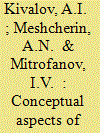| Srl | Item |
| 1 |
ID:
174061


|
|
|
|
|
| Summary/Abstract |
This paper surveys conceptual trends in organizing tests for the RF Airspace Reconnaissance and Control System (ASRCS) on the basis of comprehensive solution to the problem of improving the quality of its characteristics assessment.
|
|
|
|
|
|
|
|
|
|
|
|
|
|
|
|
| 2 |
ID:
173892


|
|
|
|
|
| Summary/Abstract |
Do international economic sanctions backfire politically, resulting in increased rather than decreased domestic support for targeted state leaders? Backfire arguments are common, but researchers have only recently begun systematically studying sanctions’ impact on target-state public opinion, not yet fully unpacking different possible backfire mechanisms. We formulate backfire logic explicitly, distinguishing between ‘scapegoating’ and ‘rallying’ mechanisms and considering the special case of ‘smart sanctions’ aimed at crony elites rather than the masses. We test five resulting hypotheses using an experimental design and pooled survey data spanning the imposition of sanctions in one of the most substantively important cases where the backfire argument has been prominent: Western sanctions on Russia in 2014. We find no evidence of broad sanctions backfire. Instead, sanctions have forced Russia’s president to pay a political price. But this price has been low compared to the massive political benefits we document arising from the sanctions-triggering event, the Crimea annexation. Moreover, hidden by aggregate figures are signs of a ‘backlash of the better-off’ by which ‘smart’ sanctions turn economic well-being from a predictor of opposition into a predictor of regime support.
|
|
|
|
|
|
|
|
|
|
|
|
|
|
|
|
| 3 |
ID:
079378


|
|
|
|
|
| Publication |
London, Facet Publishing, 2007.
|
| Description |
xvii, 329p.
|
| Standard Number |
9781856045452
|
|
|
|
|
|
|
|
|
|
|
|
Copies: C:1/I:0,R:0,Q:0
Circulation
| Accession# | Call# | Current Location | Status | Policy | Location |
| 052690 | 020.72/PIC 052690 | Main | On Shelf | General | |
|
|
|
|
| 4 |
ID:
096567


|
|
|
|
|
| Publication |
2010.
|
| Summary/Abstract |
The purpose of this review essay is to examine the use of experimental methods and its contributions to international studies research. Following a general discussion of the experimental approach, including the advantages and disadvantages of experimentation in International Relations (IR), this review moves to a categorized discussion of the ways in which experimental methods have contributed to the field of international studies. By invoking economist Alvin Roth's three purposes of experiments-searching for facts, speaking to theorists, and influencing policy debates-this classification scheme helps to identify the overarching purposes of a wide variety of experiments in the field. However, this review seeks to move beyond merely presenting a basic review of the copious experimental literature by also providing an analytical assessment of the function that experimentation serves in IR; that is, to identify and elaborate on experimental research that serves an integrative function, as a bridge across the multiple divides in the landscape of IR. To this end, we introduce a second and original classification framework that allows us to profile in detail a number of singularly significant experimental studies. We then conclude the analysis by highlighting a set of "growth areas" for experimental research that can maintain and expand the already significant contributions of experimental methods to our field.
|
|
|
|
|
|
|
|
|
|
|
|
|
|
|
|